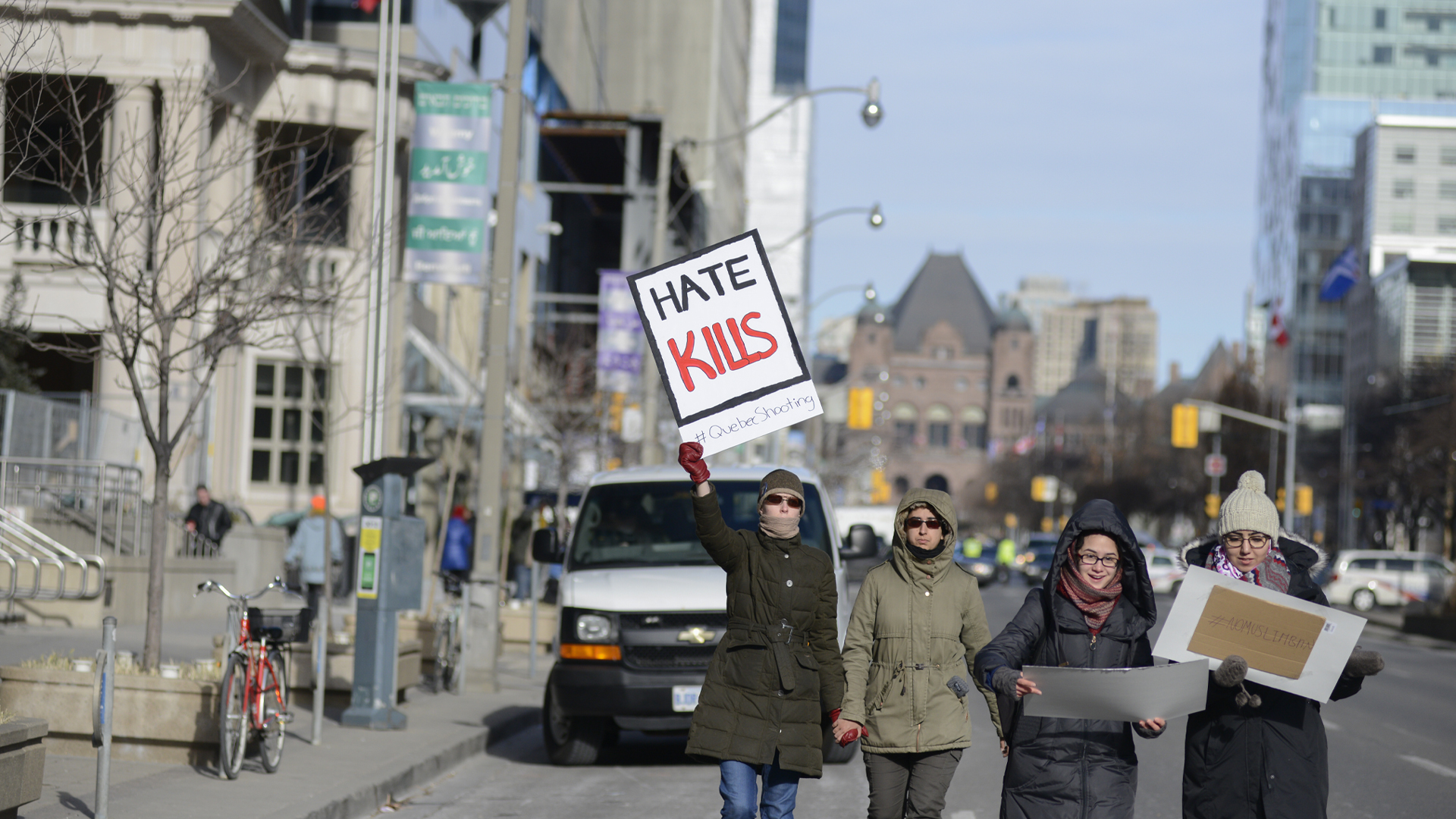
While the Canadian political landscape has remained largely the same in the aftermath of the last federal election, there are many lessons the government would do well to heed.
The National Summit on Islamophobia was held two months before the federal election, in direct response to the killing of the Afzaal family in London, Ontario. A man driving a pickup truck struck four members of the family, ranging in age from 15 to 72, leaving a nine-year-old as the sole survivor. The driver is awaiting trial for murder. It is clear this horrific case is not an anomaly. The last two decades have seen an atmosphere of anti-Muslim bias, often fanned by irresponsible and divisive political rhetoric. Recently there has been a rise of far-right white supremacist groups, whose online activity and xenophobic ideologies have led to massacres such as the Quebec City mosque attack and the Christchurch shooting.
Canadian Muslims are facing a sharp increase in violent hate crimes in public places, and in places of work and worship. One example is the murder of Mohamed-Aslim Zafis, who was killed outside a Toronto mosque in September 2020. Most recently, Black Muslim women have been disproportionately targeted by Islamophobic street harassment and assaults, particularly in Alberta. And this does not factor in the effect Quebec’s laicity law, commonly known as Bill 21, has had on relegating visibly Muslim women in Quebec to second-class citizens by preventing their participation in some public sector jobs.
Over the course of the federal election, the Canadian Muslim Public Affairs Council (CMPAC) engaged with Muslim Canadians to better understand the community’s views on party commitments. The strongest critique expressed during CMPAC’s consultations is one of frustration over the lack of specific commitments by every federal party during the election.
During the election, a National Action Plan on Combating Hate (part of a revised antiracism strategy) was promised by the Liberal Party as a way to incorporate findings from the Islamophobia summit by 2022. The Muslim community had hoped the federal government would commit to the creation of an office on Islamophobia to spearhead this endeavour.
The federal government has an urgent role to play in combatting Islamophobia in this country. As part of the National Summit on Islamophobia, the prime minister said “there’s no question that there is work to be done within government to dismantle systemic racism and Islamophobia.”
Prime Minister Trudeau continued, “As many of you have pointed out, part of the path forward must be a public service that is inclusive rather than just diverse. And the voices of all those with lived experiences and expertise on Islamophobia must be at the centre of our work.”
Meaningfully addressing Islamophobia in this country is not a simple undertaking. There is no denying that the Liberal government has inherited a number of institutions and bureaucracies that have been influenced by anti-Muslim prejudices, and this has been reinforced over many decades by successive governments that failed to recognize and tackle this problem.
That being said, it is imperative Trudeau act swiftly to address institutionalized Islamophobia now, as a first step in undoing the damage and restoring the proper function of government, which is to equitably serve the people, not to unfairly target them.
Federal office to tackle Islamophobia
A federal office with sufficient human resources and the funding to effect systemic change, whose mandate is to coordinate the policy and implementation of anti-Islamophobia measures, is essential. Here’s why.
1. The problem is institutionalized within the entire government, so it cannot be controlled by a single ministry.
2. A systemic problem necessitates the implementation of systemic solutions that result in changes in the policies, processes and systems that permit bias in various ministries and agencies.
3. Self-accountability will only produce symbolic actions. For there to be effective oversight and to support long-term implementation, the changes needed, whether at the political or bureaucratic level, must be overseen by a third party.
Canada Revenue Agency (CRA) review of prejudiced audits
The International Civil Liberties Monitoring Group and the University of Toronto’s Institute of Islamic Studies released independent studies revealing clear evidence of systematic bias and prejudice in the federal government’s auditing and revocation of Muslim charities. Both investigations contextualized this bias within Canada’s national security agencies and policies that disproportionately and unfairly targeted Muslim-led organizations.
This was the concern cited most by community members. In response, in August 2021 following the National Action Summit, the Liberal government announced a limited-scope review by the CRA Ombudsperson. This is not enough.
As the government considers how to address this issue, it should consider these recommendations made by the charity sector:
1. An immediate moratorium on targeted audits of Muslim charities by the CRA’s Revenue and Analysis Division, pending a comprehensive review. Trudeau employed this solution in his response to the CRA’s political activity audits of environmental charities.
2. The Financial Action Task Force (FATF), an international body of which Canada is a member, is currently reviewing the unintended targeting and consequences for charities as a result of the FATF’s risk-based approach and policies. Canada should do the same. Finance Canada should re-evaluate its National Risk Assessment, which has elements of systemic racism and bias toward Muslim charities.
Profiling of Canadian Muslims by the Canada Border Services Agency (CBSA)
For years, civil liberties organizations have advocated for reforms to address the agency’s abuse of authority and allegations of discrimination.
Its officers have broad authority to search, question, arrest and detain travellers. The border agency has more authority than police services when it comes to enforcing Canada’s customs and immigration regulations. Yet unlike the RCMP, CSIS and even local law enforcement agencies across Canada, which are subject to oversight, the CBSA operates without an independent civilian oversight body. As such, allegations of bias toward Muslim travellers (or those perceived to be Muslim) by CBSA officers, be it by land or air, have gone unchecked for far too long.
Additionally, CBSA officers have targeted Muslim refugees, particularly those from countries where authoritarian or military regimes have persecuted activists and opponents. Targeting of Muslims from Egypt, Bangladesh, India and Tunisia is the most prevalent. The CBSA has utilized the controversial provision 34 (1)(f) of the Immigration Act to deport these refugees back to their home countries. At the National Summit, organizations appealed to the Canadian government to amend the Immigration Act to ensure refugees are not discriminated against simply for their country of origin or their political activism, and therefore placed at risk when seeking protection in Canada.
Quebec’s Bill 21
In 2019, the Quebec government passed Bill 21 (Act respecting the laicity of the State),
which prohibits those who wear religious symbols (for example, the hijab, turban and kippah) from holding several positions in the public sector. This effectively prevents these individuals from occupying jobs such as teachers, lawyers and public servants. Although the Quebec Superior Court struck down parts of the law earlier this year, most of the discriminatory law remains intact.
The fate of this law will eventually be decided by the Supreme Court of Canada. Canada’s attorney general has the right to act as an intervener when the law goes to court, and it should. It is simple: if the government believes Canadians from coast-to-coast-to-coast have the right to freedom of religious expression, this should apply to those in Quebec as well. Turning a blind eye to this law (whose associated rhetoric can be linked to spikes of hate crimes) has had and will continue to have devastating consequences for human rights across the country.
Much of what is needed to tackle years of systemic Islamophobia in this country requires political will, the time to put these actions into practice and multi-partisan support for their long-term implementation. The government must move quickly to create a federal office to confront Islamophobia, understand these pressing issues and tackle them. If appropriate and timely action is not taken, the Trudeau government will find it more difficult to convince Muslim voters that there was insufficient time to address Islamophobia in the country.










